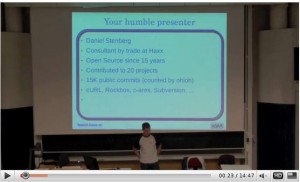Ok, I admit it. I run Debian Unstable so I know I deserve to get hit really bad at times when things turn really ugly. It is called unstable for a reason.
The other day I decided it was about time I did a dist-upgrade. When I did that, I got a remark that I better restart my gnome session as otherwise apps would crash. So I logged out and… I couldn’t login again. In fact, neither my keyboard nor mouse (both on USB) worked anymore! I sighed, and rebooted (for the first time in many months) only to find out that 1) it didn’t fix the problem, both input devices were still non-functional and perhaps even more important 2) the wifi network didn’t work either so I couldn’t login to it from one of my other computers either!
Related to this story is the fact that I’ve been running an older kernel, 2.6.26, since that was the last version that built my madwifi drivers correctly and kernels after that I was supposed to use ath5k for my Atheros card, but I’ve not been very successful with ath5k and thus remained using the latest kernel I had a fine madwifi for.
I rebooted again and tried a more recent kernel (2.6.30). Yeah, then the keyboard and mouse worked again, but the ath5k didn’t get the wifi up properly. I think I basically was just lacking the proper tools to check the wifi network and set the desired ssid etc, but without network that’s a bit of a pain. Also, when I logged in on my normal gnome setup, it mentioned a panel something being broken and logged me out again! 🙁
Grrr. Of course I could switch to my backup – my laptop – but it was still highly annoying to end up being locked out from your computer.
Today I bought myself 20 meter cat5e cable and made my desktop wired so I can reach the network with the existing setup, I dist-upgraded again (now at kernel 2.6.31) and when I tried to login it just worked. Phew. Back in business. I think I’ll leave myself with the cable connected now that I’ve done the job on that already.
The lesson? Eeeh… when things break, fix them!




